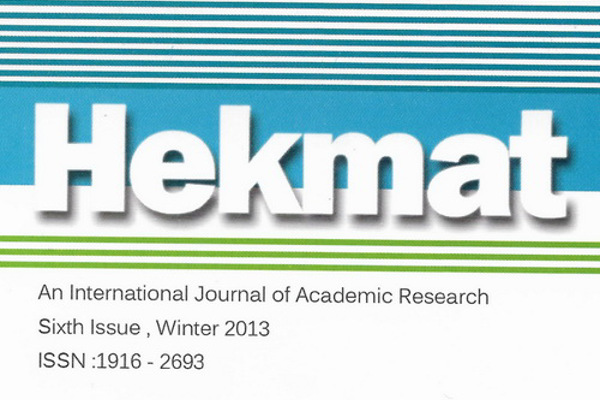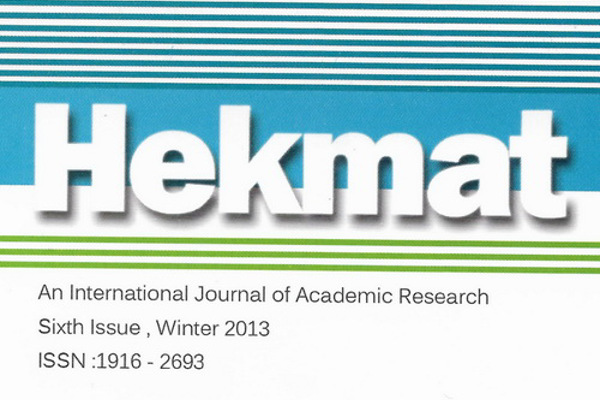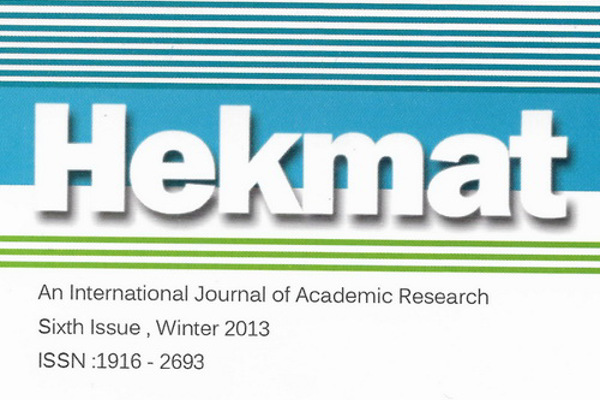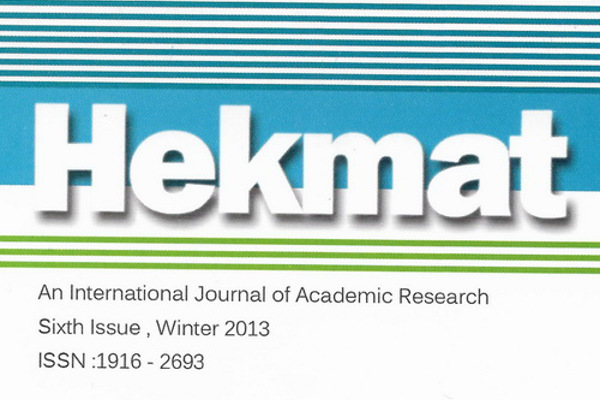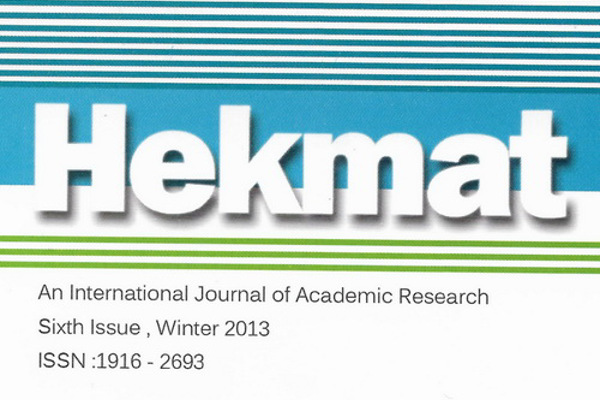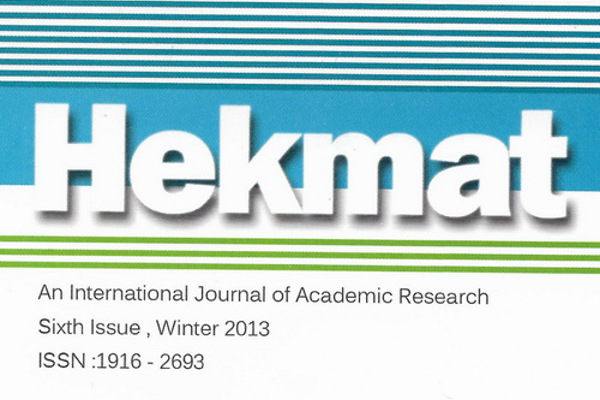Preservation of environment in Islamic teachings / By: Ibrahim Bateni
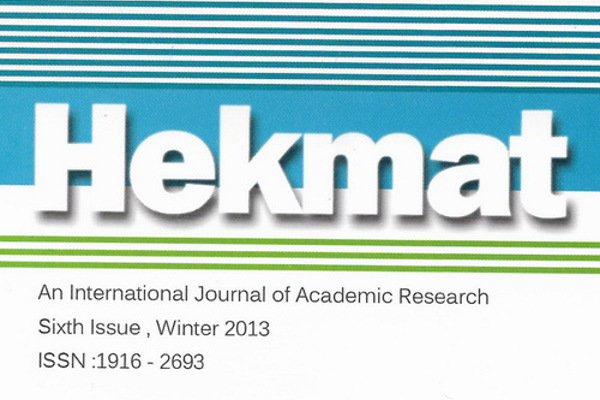
Preservation of environment in
Islamic teachings
By: Ibrahim Bateni [1]
Abstract
Social industrial developments in different societies have given rise to various new issues including a new set of crimes known today as ecological crimes. Although man has ever been thoughtful of the importance of and respect for environment, the advance of science and technology gave man control over nature and the ability to exploit it. As a result, a fundamental change in human beings view towards nature and environment paved the way for increasing utilization of nature. However following the industrial revolution and the ensuing problems caused by technology, man’s attention was again drawn to environment. Consequently, preservation of environment and how to protect it from pollution emerged as one of the very important issues in the latter part of the 20th century. One important question here is how Islam looks at protection of environment.
Keywords: environment, religious teachings, public participation, subject matter based interpretation
Introduction
The present age especially the sixth and the seventh decade of 20th century mark the advent of awareness and global widespread attention to ecological issues. No one can now ignore these issues under any circumstances. Human interaction with nature and environment has had three epochs. In the first epoch, hunting is the predominant form of production in society. The next epoch belongs to agricultural society. The industrial revolution marks the advent of the senate epoch. It is in this last epoch that explorations, inventions, science and production expand drastically. Almost parallel to industrial revolution that started in 1760 social and cultural revolutions also emerged (Bronoski, p.1). Understanding nature soon gave birth to a new concept: affecting changes in nature in order to gain energy. Invention of Techniques for changing one form of energy to another contributed to scientific advancement largely (Bronoski, 1380, pp. 295-297). The social revolution following the industrial revolution brought about notions such as social equality and common rights and fraternity gradually changing human vision of its place in the world fundamentally. The traditional vision in which man just one part was of and the inhabitant of this world was replaced by a new vision that considered man as the owner and the holder of the earth. This new vision was essential for man’s success in exploiting the world of nature and exercising dominion over it though it also marked the beginning of the process of vast destruction and ruin of nature simultaneously (Ward and Dubos, 1974; 24). A long time passed till the threats posed by the destruction of environment triggered the opening of a new chapter in global human awareness that called for replacing the ideal of dominion over nature and exploitation of all its resources with more human friendly ideas of cooperating with nature, taking its capacities into account and preserving the environment. Today man is highly concerned with ecological problems and relentlessly tries to overcome them through proper planning and management, necessary and regulations and finally enhancing the present technology to a reasonable level so that polluting and destructing machines and techniques can be replaced with pure and nature friendly ones making it possible to preserve natural environment rationally (Lidgerwood & Idol Broadhurst, 1999, pp. 168-169).
Ecological issues are now the subject of attention and concern for different groups of people in society especially philosophers scientists and politicians. The majority of important corporations in developed countries pay attention to ecological issues as an indispensable part and parcel of their strategic planning and management. In new idea is gradually being formed in this respect; after the agricultural and industrial evolutions, human society now needs an ecological revolution (Lawasani, 1372; 17). It seems that the question of environment has for the first time captured world attentions as the axis of politics (Lawasani, 1372; 7). Various organizations, associations and social groups have emerged as proponents of environment preservation known as greens or Greenpeace. They are engaged in a wide range of activities me to draw the attention of people all over the world to ecological facts and the vital necessity of environment preservation has an absolute value and a condition for the survival of human race and other natural species on this planet.
In brief, ecological problems as repercussions of technological advancements in intestinal societies emerge in a wide range of forms inclusive of various pollution forms, destruction of jungles, pastures, some species of animals and plants (especially those rare ones on the threshold of extinction), erosion of the soil, rapid and excessive population growth and the like. This is partly the result of the interdependent, interwoven and closed cycle of life. The life net is governed by a rational solidarity and coordination imprinted therein by a wisdom. Every part of this whole plays the special role it is designed to do. For this reason, it is not reasonable to break the equilibrium of the whole by over exploitation. Otherwise the repercussions and unwanted consequences of greed, unquenchable thirst and corruption will be irreparable and all comprehensive. [2] In addition to this, ecological problems are characteristic in the sense that they are multilayered. They should be studied has interdisciplinary issues. They relate to discipline such as economics, medicine, psychology, sociology, biology, geography and the like. New disciplines have now been in place such as ecological chemistry, ecological economy and ecological engineering.
As a criterion and instrument for the establishment of security and order and protection of peace and comfort in society, law intimately connects to ecology. To meet the challenges posed by threats to environment and ecological crimes proper legislation, efficient policies, a comprehensive approach to cultural development and consistent use of all these elements are needed.
Bearing in mind that religious vision and the teachings of religions play a fundamental role in providing a proper outlook to the environment and human responsibility towards it, Islamic teachings as a part of our culture and identity and the basis of legal systems in many Muslim countries deserve to be studied from the point of view of ecological problems.
1. The concept of environment
As a matter of fact it is very difficult to give a proper and complete definition for terms and concepts. The term “environment”[3] as presently used is a new word in many languages. In French language this word was first used in the twelfth century (Case, 1379, vol. 1, p.5). Since 1360, it has been used frequently and translated into many languages[4]. The story of the coining and use of this word indicates the collective attention that humanity has paid to this new phenomenon of the modern world.
Some authors doubt that a precise definition for this term can be given in a unique, legal and comprehensive concept (Taqizadeh Ansari, 1376, p. 14). The concept environment may differ from country to country according to each country’s valuation of particular ecological elements. For example, some countries render the protection of their waters and right of fishing more important. In other countries presentation of jungles and pastures are the most important. Consequently, the former group of countries define environment on basis different the basis on which the letter does. At any rate, in Iranian legal literature of no exact definition for environment is proposed.
The tram tabiat in our culture is very close in meaning to the term environment. The only difference is that the former term refers to every object in the creation of which man has not played a role. The meaning of environment is intimately connected to the meaning of the word “biosphere”. As used by UNESCO[5], “biosphere” is synonymous with the word “environment” in the widest sense of this letter word. In this sense, it means the place where human beings live or that part of the world in which life goes on according to our present knowledge (Case, 1379, vol. 1, p. 5).
To give a more humane definition for environment, we can say environments means the area or region on which human life and activities depend directly or indirectly (Mir Qawam, 1375, p. 3). In simple words, the environment means the sum up of “ water, soil, air, plantation, forest, pasture, grove, sea, lake, river , spring, marines , animals, mountains, deserts, land, plain, city, village, building, street, lane, constructions(where historical or otherwise) facilities and unlike(Banan, 1351, vol.1, p.5).
Environment is also defined as “the general circumstances within which the process of life is going on and upon which it reciprocally acts. In this definition, the word environment refers to nature, human societies and the spaces made by human thought and work. In this sense, it includes the entire living place on the planet earth or biosphere (Bahram Soltani,, 1371 vol. 6, p. 1).
Finally we can determine a definition for the word environment based on the usage of the term in the convention concerning civil responsibility for damages resulted from dangerous activities adopted by the council of Europe. According to this definition, environment includes:
- Natural resources both the renewable and the nonrenewable such as air, water, soil, all animals and plants and their reciprocal interactions
- The riches and properties considered as cultural heritage
- Sites and perspectives
Religion and environment preservation in the present world
A glance at the history of religions suffices to indicate that man has always respected nature and sometimes has even worshiped if some manifestations of nature in different historical eras. It is since approximately 30 years ago that ecological problems and debates have reached the climax and thinkers have come to search for certain cultural elements to help them solve these problems. As a result, scientists and specialists have started to investigate the possibility of interdisciplinary discussions about religion and environment. These discussions are aimed to help complete legal measures taken to combat ecological threats humanity faced with.
Several conferences were held to explore solutions for ecological crises in collaboration with cultural and religious institutions. In this regard, we may cite the Moscow international conference of 1990 on the title “to solve ecological crises true and interaction between religion and science”[6]. A series of conferences were held by Harvard University during the years 1996 to 1998 with similar themes. Three more conferences where later held by sciences and arts academy of Cambridge university, United Nations and New York’s museum for natural history respectively. These three conferences discussed the conclusions of the 10 conference is held by Harvard university. A conference was held in Tehran under the title” religion and the contemporary world” in which religious scholars affiliated to different world religions introduced their views about environment and ecological ethics from the perspective of their faith and the role world religions can play in this field(Rashad, 1381, pp. 25-29).
In Iran religious teachings and the prevalent cultural atmosphere form the foundations of law and the legal system. According to clause four of the Iranian constitution, all rules and regulations must accord with Islamic precepts. This principle overrides all other the principles of constitution and normal rules and regulations. Therefore, the religious outlook to environment according to Quran and Islamic precepts are of utmost importance to as far as cultural and legal bases are concerned.
2. Environment preservation in Islamic teachings
The continuation of ecological problems and crises is one reason why man’s approach to religion has recently changed on global scale. Religion is now seen as a parameter that can play a positive role in mitigating ecological problems. Many environmental activists have now come to believe that for ecological policy to be efficient it needs to be comprehensive and supported by religious and ethical beliefs. Teachings of Islam, Judaism, Christianity, Zoroastrian faith, Hinduism and other living religions of the world accommodate respect for nature and the cosmos as a moral principle (Case, 1379, vol. 1, p. 708).
As a religion, Islam is based on universal and comprehensive principal foundations. One Islamic principles says” God as gifted man reason as a characteristic exclusive to him for that reason man is to administer his life and the entire world with sincerity. He is charged with the responsibility and to protect his life and the world”. [7] In what follows, we shall cast light on some of Islamic precepts and principals in the relation to environment and the responsibilities of any Islamic government in this regard.
3. Islam’s vision of environment
Islam introduces a system of values the implementation of which guarantees man’s advance on the path of perfection during his life. This set of values identifies how an individual’s relation to God, to other individuals, to himself and to the environment should be. On the basis of these values, one decides how to utilize natural resources, interact with nature and other people and learns to recognize the right of other people, animals, and plants and even inanimate objects in this world. Islam has paid close attention to the environment and ecological issues. Destruction of environment and any damage to it including killing tamed animals, eradicating trees and causing pollution and contamination of land or water are all prohibited even in war (Ziaii Bigdeli, 1375, p. 148). we mention some of the principles and precepts of Islam regarding environment here.
Islam as a comprehensive religion
As the final divine religion, Islam proposes a comprehensive plan for salvation, prosperity and material as well as the spiritual perfection of individual and society. Almighty God emphasizes in the holy Quran that nothing relevant to man’s salvation has been overlooked in Quran[8]. It is the task of Muslim thinkers to try to understand what Islam wants for humanity in different fields.
Islam has said its word on all human affairs and relations whether terrestrial or heavenly, social or private, this worldly or the next worldly from the moment one is born to the moment one breathes his last. Even the way human beings must treat animals has not been overlooked. This does not however mean that permanent rules and regulations applicable to particular cases have been enacted once and for all. It rather means the general guidelines and universal values man can refer to in order to enact necessary rules and regulations of certain explained in Islam. Eco ethics is only one example. No particular regulations concerning human behavior to environment is fixed there in Islam. Rather, we have Islamic values that relate to how to treat water, soil, earth, air, wind, dust, fire, and the like and how to keep scenes clean and to avoid pollution, contamination and poisoning. There are so many verses in the Quran and so many sayings of the holy prophet and the immaculate imams and out relevant issues based on which we can derive exact ecological regulations. It is most unfortunate that Muslim scholars and the researchers of Islamic religion have not yet presented a complete comprehensive package of ideas and regulations in the field of environment according to Islam( Gorji, 1363, p. 111).
Quranic verses
In several verses of Quran mention is made of various manifestations of nature as the signs and symbols indicating God and his power in creation. In some cases almighty God mentions some natural phenomenon in a way that seems to be his swearing and oath. Quran invites people to contemplate the wise ways of divine creation. Discussions about nature and environment aren’t scarce in Quran. One focal point in all these cases is the emphasis on the rational relationship that must stand between man and the environment.
In a verse of Quran God says: “it is he who created you from the earth and charged you with the task of constructing it” (HUD, 61). Reiterating the fact that the world is created on the basis of appropriateness, Quran forbids the spread of corruption.[9] In one place, having stated that man is allowed to benefit from the livelihoods God has provided him with, Quran walls people against causing corruption in the world.[10] It goes without saying that unreasonable utilization of the bounties of nature and excessive consumption or cause pollution and contamination are considered instances of corruption. So as the vicegerent of God[11], man should recognize his place in the universe and remember his responsibilities always and should stand up to his tasks carefully and reasonably.
The hadiths
Much emphasis is laid on ecological ethics and the preservation of the environment in various hadiths (traditions and sayings of the holy prophet and the immaculate imams). We should mention some of them here.
A saying related to the holy prophet of Islam says that Islam is their religion of purity. People are all charged with the religious responsibility observing purity as a principle. It is emphasized that the heaven as a symbol of purity exclusively belongs to the pure (Heidari, 1379, vol. 2, p. 998). Planting trees, constructing gardens and Parks and recreation sites are considered virtuous deeds in Islamic texts. Muslims are encouraged to attend to these virtues deeds. The holy prophet of Islam is quoted to have said:” I very much like three things: watching a green scenery, flowing water and beautiful face” (Heidari, 1379, vol. 1, p. 292).
In another tradition the holy imam says even if you are at the moment the resurrection day is just going to come and you had a plant in your hand do plant it before you lose the opportunity (Heidari, 1379) vol. 2, p. 713). in another tradition, planting trees and digging Wells and similar activities are considered as virtuous as constructing mosques and teaching people (Heidari, 1379, vol. 1, p. 497). The holy prophet of Islam says three groups of people are cursed because of their behavior: people who pollute public places like passenger terminals and resting places, people who usurp public water and people who block avenues and roads(sheikh Horr Ameli, vol. 1, p. 325).
Jurisprudential principles
There are general principles and Islam that we can infer new principals from them. One of the general principles is the principles that no harming is allowed. This principle estates the spirit of all Islamic laws so to say. According to this principle nobody is permitted to carry out any activity that harms someone else. Even if someone does something in order to retain his right, if his action harms of someone else or causes damage, he is responsible for compensation. Another jurisprudential principle says that every person enjoys rightful domination over his property. But the second principle applies only in case he doesn’t conflict with the previous one. When they clash the form of principle is to be preferred in practice (Mohaqeq Damad, 1363, p. 156). accordingly, and for individual who causes environmental pollution through producing or consuming something, he is held responsible. If the party that sustains the damage happens to be society or the future generations then the state has to prevent that activity protecting society and the new generation (Sadeqi & Farahani, 1382, p. 43).
In clause 40 of the Iranian constitution this principle is the referred to. International law acknowledges this principle with slight modifications (Taqi Zadeh & Ansari, 1378, p. 68). In addition to the principle of harm prevention, there are rules according to which it is legitimate stop any activity that pollutes or damages the environment. Public property belongs to everyone. No one is permitted to damage them even within the jurisdiction of tyrannical governments. Islam calls public property and natural wealth has anfal.
Another general universal principle in Islam is the principle of enjoining virtue and forbidding evil. Quran calls every one both to do well and to call others to do well.[12] This principle is not limited to a particular domain it is rather a constructive cultural instrument for protecting society via collective participation (Haji Deh Abadi, 1383, PP. 77-106). because damaging the environment and public property is an obvious evil, all people all are charged with the task of preventing it. Quran says people should be warned against a calamity that befalls not only on the unjust.[13]
Islamic government and the environment
There are some riches on the planet earth that belong to all people equally as divine gift to human beings. They are called anfal in Quran. It is the responsibility of the Islamic government to administer this wealth and supervise that it is used for the interest of the society. These riches cannot become private property and even the statesmen have no right to put their hand on them (Mir Husseini, 1380, p. 103). Anfal includes all natural wealth such as jungles, pastures, mines, free lands, mountains, and valleys, shores and the movable and immovable properties that happen to be owned by no person such as the property of a dead person who has no heir or the properties given up by the owners, the properties of infidel kings of territories conquered in a just war, unique monuments or invaluable items cut from enemy (Tabatabaii, 1379, p.41).
Inspired by Islamic teachings, the constitution of the Islamic Republic of Iran has paid attention to the question of public property. According to principle 45 of the constitution, “Public wealth and property, such as uncultivated or abandoned land, mineral deposits, seas, lakes, rivers and other public water- ways, mountains, valleys, forests, marshlands, natural forests, unenclosed pastureland, legacies without heirs, property of undetermined ownership, and public property recovered from usurpers, shall be at the disposal of the Islamic government for it to utilize in accordance with the public interest. Law will specify detailed procedures for the utilization of each of the foregoing items.
Clauses 25 and 26 of civil code state government’s ownership of public property and its exclusive right to administer public property according to national interests. For this reason, anfal would be controlled by the Islamic government during the period of the occultation of immaculate imam in order to deter mine its proper use and manage it (Shams, 1376, p. 46 and Taqi Zadeh Ansari, 1378, P. 43-44).
If it is one of the main responsibilities of the state to provide for public comfort , if the society reaches the necessary comfort through enjoying healthy environment, then the state must be given authority to stop any activity that may endanger ecological health hence public comfort. This is implied in clause 48 of Iranian constitution.
It is prohibited to make any policy or carry out any activity that can jeopardize social order. For example in spite of the fact that Islam allows utilization of shared resources and permissible items, if population growth and excessive utilization of these resources happen to seriously damage or virtually destroy them, the original permission would be canceled or limited. This is indicated in clause 44 of the Iranian constitution that identifies forms of ownership.
Government is responsible to implement constitutional provisions. Therefore it must take necessary measures to limit personal freedom of people via legislation according to the interest of the nation where it is necessary. It goes without saying that limitations imposed on personal freedom must be confined to inevitable cases because the only purpose state is allowed to pursue is better management of reasonable utilization of natural bounties in the country(Sadeqi Farahani, 1382, p. 44).
Conclusion
Wise harmony and solidarity govern the net of life; every part of this whole place its special role for which it is designed. So, we shall not put this equilibrium in jeopardy by excessive utilization. It is most unfortunate that outstanding advancement of science and technology following the industrial revolution enabled man to exploit nature so harshly and excessively that the modern phenomenon of ecological crisis emerged as a result. Ecological crisis cannot be solved unless proper vision of the environment and sufficient public awareness about it are in place. The attitude to environment cherished by Islamic culture is far firmer and more stable and the attitude we find in ecological laws enacted internationally or at national levels in different countries. In the family of international law in new branch has emerged that deals with the ecological law but it is still too young; it is approximately 30 years old. In Islamic teachings as the main source of legal system in Iran, he obviously see the emphasis on preservation of environment. It should not be neglected that a thorough comprehensive study of this subject matter requires further investigation on Muslim scholars as a prelude to a coherent strategic policy and efficient implementation.
The right of people to healthy environment is now acknowledged as one of fundamental human rights. To enable people to exercise this right of theirs, the principles of prevention, public participation and sustainable development are prescribed. It is believed that these principles contribute to the preservation of environment. The legal and cultural foundations of these principles can be found in religious teachings. The first two principles are especially reiterated in Islamic precepts. It is the responsibility of Islamic government to take every necessary measure for planning, managing and supervising the process of sustainable development.
Bibliography
- The holy Quran
- Nahj al Fasahah, (1379), researched by Gholam Hussein Heidari, Qom, Ansarian publication center, volume two,
- Aryan Pur Kashani, Abbas, (1366), Manuchehr Aryan Pur Kashani, English Persian dictionary, Tehran, Amir Kabir publication center, 10th edition, volume one
- Brodsky, J., Man’s ascent to power, Persian translation by Azar Aryan Pur, Iranian open university press center
- Banan, Gholam Ali, (1351),” human environment; protection from pollution”, Tehran, the National Association for the preservation of natural resources and human environment, volume one
- Bahram Soltani, Kambiz, (1 371), the collection of discussions on city construction and environment, Tehran, the Iranian center for studies and research on architecture and the city construction, first edition, volume six
- Year Dumpty, (the string of 1380), the history of science, Persian translation by Abdolhussein Azarang, second edition, Tehran, Samt organization
- Taqi Zadeh Ansari, Mostafa, (1376), ecological panel code, Tehran, Qum publication center, firs edition
- _______________________, (1378), law and the natural resources, jangal w marta Mackenzie, number 43
- Haji Deh Babaii, Mohammed Ali, (summer of 1383), the principle of enjoying virtual and forbidding evil and penal policy, Fegh-h w Hoquq quarterly, number one
- Hor, Ameli, Mohammed bin Hassan, Wasael al Shiah, Beirut, the center for revival of Arab heritage, volume one
- Shams, Ahmad, (fall of 1376), the legal regime of nationalized lands, Tehran, Dadgostar publication, first edition
- Sadeqi, Hussein & Farahani, Said, (summer of 1382), environment from the point of view of religion and economics, specialized magazine of Islamic economy, the cultural institute for contemporary thought and science, number 10
- Zyaii, Bigdeli, Mohamed Reza, (summer of 1375), Islam and international law, Tehran, Ganj Danesh publication center, first edition
- Tabatabaii, Mohamed Hussein, (1379), Almizan, Dar al Kotob al Islamyyeh publication center, volume nine
- Qawam, Mir Azim, (1375), Penal protection of environment, Tehran, environment protection organization publications center, first edition
- Case, Alexander, (1379) an introduction to ecological international law, Persian translation by Mohamed Hassan Habibi, Tehran, Tehran university Press center, first edition, volume one
- Gorji, Abolqasem, (1363), Islam and environment, Nur e Elm magazine, first Series, number one
- Lawasani, Ahmad, (1372), Rio international conference on environment, foreign ministry publication center, first edition
- Mohaqqeq Damad, Mostafa, (1363), jurisprudential principles, Olum Islami publication center, Tehran, first edition
- Mir Husseini, Seyyed Ahmad, (winter 1380), anfal in Islam, Qom higher education center magazine, the third year, volume 11
[1]. member of scientific board of Payam-e-Nur University in Isfahan.
[2]. Quran, sura Anfal, verse 25.
[3]. “environment ‘is translated into umwelt in German language.
[4]. In Japanese, environment is translated into “kankyo, in Russian language: zha ifuchaia serda, in Portuguese: ambient and in Arabic: beiah. If.
[5]. United Nations educational and scientific and cultural organization.
[6]. preserving and cherishing the earth: an appeal for joint commitment in science and religion global forum(January 1990) national religious partnership for the environment, Moscow.
[7]. Islamic principles for the conservation of the natural environment, IUCN environmental policy and law, paper number 1938, P.9.
[8]. Quran, Sura Anam, verse 38: “we have not overlooked mention of anything”, also Sura Nahl, verse 89: “we sent you a book explaining everything”.
[9]. Quran, Sura Aaraf, verse56: “… And do not spread corruption in the earth after it has been reformed”.
[10]. Quran, Sura Baqareh, verse 60: “… And do not try to spread corruption in the earth”.
[11]. ibid, verse 30: “and when your lord said to the Angeles: I am going to appoint my vicegerent on the planet earth…”.
[12]. ibid, Sura Aaraf, verse 199: “…and order according to custom…”.
[13]. ibid. Sura Anfal, verse 25:” and beware of a calamity that befalls not on the unjust alone”.


